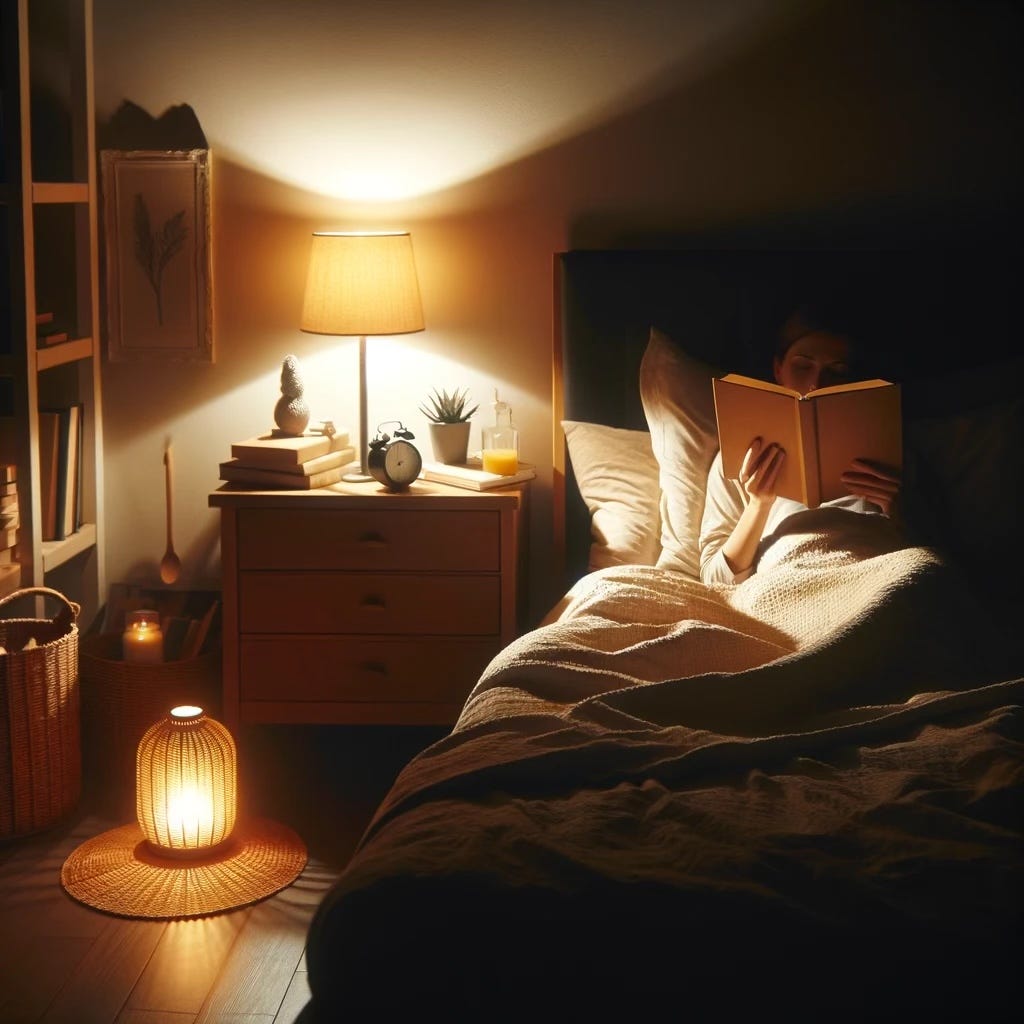Flipping The Page On Sleep Issues
A Conversation with Gina Fontaine of Cereset® (Denver)
Sleep, which is a vital yet often neglected component of our health, profoundly influences our well-being, productivity, and overall quality of life. Many of us, however, suffer from sleep issues.
Sleep deprivation and broken sleep patterns can have far-reaching effects, impacting everything from cognitive function to mental health. Understanding these effects while seeking ways to improve sleep hygiene is essential for anyone grappling with these types of issues.
The consequences of sleep deprivation are extensive. Chronic lack of sleep can impair cognitive functions such as memory, attention and decision-making.
Research, in fact, has shown that sleep deprivation can affect the prefrontal cortex, the brain region responsible for complex cognitive behavior and decision making, leading to impaired judgment and increased risk-taking behavior. Furthermore, it can disrupt emotional regulation, often resulting in heightened irritability, anxiety, and an increased risk of depression.
Physiologically, inadequate sleep can have severe repercussions. It weakens the immune system, making the body more susceptible to infections.
Long-term sleep deprivation has been linked to serious health conditions such as obesity, type 2 diabetes, cardiovascular disease, and hypertension. This is because sleep affects various bodily functions, including metabolism, heart rate, and hormone regulation.
Sleep disturbances also affect daytime functioning. It can lead to reduced work productivity, increased absenteeism, and a higher likelihood of accidents. In fact, studies have shown that sleep deprivation can have similar effects on motor and cognitive functions as alcohol intoxication.
A year or so ago I had the good pleasure of meeting Gina Fontaine, Client Center Manager at Cereset®, an innovative company that helps clients achieve real-time brain harmony. In talks both publicly and privately, she has been very willing to open up about her own personal experiences with sleep deprivation that she says began at a very early age,
Says Gina:
“I started my life with little chance to establish healthy sleep patterns. My six older brothers would, according to my mom, purposely wake me from my nap as an infant, just so they could go to the pool. As a child, I vividly remember staying up late with my parents to watch Johnny Carson when most kids were already slumbering for hours. I became both a night owl and an early riser.”
She adds that the arrival of her first child in 2003 made her experience with sleep deprivation even worse. Having been awakened every two hours throughout the night, she stumbled through each day like a sleep-deprived zombie for the entire first year of his life.
A short time later Gina discovered a sleep study conducted by the University of Colorado that offered compensation. She eagerly decided to volunteer for it. Recalling that period in her life, she adds:
“They asked me to track my nightly sleep hours and get out of bed if I was awake for more than 20 minutes. I discovered that I was only getting 5 1/2 hours of sleep per night. I was then advised to establish a bedtime and count forward 5 1/2 hours to determine my wake-up time. Adhering to this routine was extremely challenging, but eventually, I managed to increase my sleep duration to around 6 hours per night, still falling short of the recommended 7-9 hours.”
Gina says that she used to boast to others about her ability to function on minimal sleep, convinced that she was doing just fine.
“I could teach 2-3 fitness classes a day and care for my three young children without any issues. Looking back, I now realize that I was running on pure nervous energy.”
During the crumbling and eventual end of her marriage, her sleep problems reached their peak.
“As a single mother and head of the household, I suddenly became the primary breadwinner. Struggling to make ends meet, I worked at a fitness center that opened at 5 am every day. Many times, I would wake up at 2 am after only three hours of sleep and remain wide awake. There were stretches of days when I couldn't sleep at all.”
Gina says that she desperately invested thousands of dollars in holistic remedies and supplements that offered only temporary relief.
“The only thing that could effectively knock me out was cannabis, and that became a nightly, and sometimes mid-nightly, habit. I felt ashamed for relying on getting high every night, but it was the only solution that seemed to work.”
She continues:
“Little did I know that my brain was trapped in a perpetual state of fight or flight. The CEO of my own body was overworked and burned out to the point where it couldn't process any external information anymore.”
2022 is when she began working with Cereset for the soon-to-open center in Denver, Colorado.
“Cereset is a relaxation process that utilizes brain-initiated sound tones, reflecting the brain's frequencies back to itself. This unique approach enables the brain to self-correct imbalances and form new neural networks, ultimately restoring optimum brain function.”
She continues:
“After my third session of Cereset I slept 8 hours without waking and I felt more rested than I ever had in my life. After the initial 30 day reset period, my relationships improved, my productivity surged, and most importantly, I felt free from relying on using a substance to relax every night.”
Asked why some people sleep better than others, Gina had this to add:
“Occasionally, we all experience nights of disrupted sleep that leave us feeling groggy and unable to perform at our best the next day. However, when an individual wakes up three or more times during the night or consistently sleeps less than six hours for three or more months, it may be a sign of insomnia. Insomnia is often related to a significant stressor in one's life, such as a divorce, the loss of a loved one, a traumatic event, or a job loss. These changes can have a profound impact on the nervous system, leaving individuals in a state of chronic fight or flight or even freeze.”
Fight or flight, she says manifests as anxiety, racing thoughts, and an inability to relax. These prolonged periods of stress or trauma can cause the brain to shift into a freeze state as a protective mechanism.
“In this state, individuals may experience a lack of motivation, low energy levels, or even depression. At Cereset, we offer a baseline reading of the brain's stress regulation center, the temporal lobes, using EEG sensors. By analyzing the brain's rhythms, we can identify subconscious and conscious activity patterns.”
Gina adds:
“An overactivation of the right temporal lobe indicates a propensity towards fight or flight, while an imbalance in the left temporal activity reflects a freeze state. In rare cases, an individual may experience a dual imbalance where the brain is simultaneously in fight/flight and freeze modes. It's like driving with the brakes on. This was the state of my brain when I began my journey with Cereset.”
Given all of this, Gina emphasized that it would be a good idea to consult with a healthcare practitioner in order to rule out possible medical reasons like sleep apnea for sleep disruption.
Asked for her opinion as to whether there are drawbacks to using sleep aids like melatonin, adaptogens, and CBD, she had this to say:
“Using sleep aids are a band-aid solution that do not address the underlying causes of poor sleep. Even so-called natural substances like melatonin have risks involved. In fact the FDA does not regulate the potency and sourcing of the ingredients for supplements and most are synthetically produced.”
She in fact cites a June 2022 blog post titled, Is Melatonin a Safe Sleep Solution, where Cereset Client Services Director Sonya Crittenden wrote,
“What we understand is this: the brain is a highly intricate, extremely complex, and infinite system. In fact, there are more connections in the brain than there are stars in the observable universe. The brain is vast and complex, and there is still much we do not understand about how it works….The truth is, it is impossible to know how adding a foreign substance to the brain will impact it, so we encourage our clients to do their own research, trust their own instincts, and treat their brain with the respect, care, and awe it deserves.”
Adds Gina:
“In short, supplements create a masking effect and do not get to the root cause of the issue of restless nights. Biofeedback approaches like Cereset reprogram the brain, empowering it to establish healthy Circadian rhythms and more restorative sleep.”
Gina says that Cereset® is a safe, effective way to assist the brain to naturally reset and rebalance itself.
“Our patented BrainEcho® technology is a non-invasive process using only brain-initiated sound to relax the brain, allowing it to reset itself and freeing it from either a freeze or fight-or-flight-state.”
“The sound tones essentially reflect the brain back to itself, acting as a mirror. What sets this approach apart is that it operates from the inside out, with the brain taking the lead instead of relying on medications, computer programs, or external influences like hypnosis.”
She says that typically, individuals suffering from sleep deprivation already lack energy. When information is processed through externally driven methods, the brain she notes expends additional energy.
“In my personal experience, I attempted various remedies such as acupuncture, Reiki, massage, binaural beats, and neurological patches applied to my skin in an effort to address my sleep issues. However, my overwhelmed brain struggled to process any new information presented. I would get temporary relief but nothing long-lasting.”
In a concluding thought, Gina offered this”
“The Cereset process enables the brain to create new neural networks and that coupled with a new healthy sleep routine sets an individual up for a more permanent turnaround in disrupted sleep patterns.
The brain is not burdened with processing unfamiliar elements, as it only works with what already exists. The experience is effortless and soothing, allowing the brain to naturally calm itself. With Cereset® training, the brain cultivates resilience, enabling smoother navigation through life's challenges, including major stressors and even trauma.”
Falling Asleep With A Book
If you are seeking to improve your sleep patterns, knowledge is power. Here are five valuable books that offer insights and strategies for combating insomnia and enhancing sleep quality:
Why We Sleep: Unlocking the Power of Sleep and Dreams by Matthew Walker, Ph.D: This book provides a deep dive into the science of sleep. Walker, a renowned sleep scientist, explains the biological mechanisms behind sleep, the profound effects of sleep deprivation, and practical strategies for improving sleep.
The Sleep Solution: Why Your Sleep is Broken and How to Fix It by W. Chris Winter, M.D: Dr. Winter combines research with years of clinical experience to offer a comprehensive guide on various sleep disorders. His book is filled with practical advice for individuals looking to overhaul their sleep habits.
Sleep Smarter: 21 Essential Strategies to Sleep Your Way to A Better Body, Better Health, and Bigger Success by Shawn Stevenson: This book focuses on how sleep impacts physical health, weight loss, and overall well-being. It provides actionable tips to enhance sleep quality, including dietary changes and lifestyle adjustments.
The Nocturnal Brain: Nightmares, Neuroscience, and the Secret World of Sleep by Guy Leschziner: A great read that delves into the complex world of sleep disorders through fascinating patient stories. It's an insightful read for anyone looking to understand the more unusual and intricate aspects of sleep.
Quiet Your Mind and Get to Sleep: Solutions to Insomnia for Those with Depression, Anxiety or Chronic Pain by Colleen E. Carney, Ph.D., and Rachel Manber, Ph.D: Tailored for individuals whose sleep issues are compounded by mental health or chronic pain concerns, this book offers a cognitive-behavioral therapy approach to improve sleep.
Incorporating the knowledge and strategies from these books can be a significant first step towards overcoming sleep issues. However, for chronic or severe sleep disorders, consulting a healthcare professional is crucial.
Improving sleep hygiene not only enhances physical and mental health but also enriches overall quality of life. As we continue to understand more about sleep's crucial role in our health, prioritizing adequate and quality sleep becomes not just a necessity but a fundamental aspect of self-care.
You're Invited to Join Our Literary Journey!
Welcome to "Great Books, Great Minds," where my passion for books takes center stage. This endeavor is more than a project; it's a labor of love that's driven by countless hours of research and writing. It's my way of contributing to a world filled with community, connection, and meaningful conversations, all nurtured by the power of literature.
If you've found this digital newsletter to be a source of inspiration and insight, if you relish the opportunity to explore exceptional books alongside remarkable authors and fellow book enthusiasts, then I'd like to extend a special invitation to you.
Join our community as a valued supporting member with a subscription at just $6.00 per month or $60.00 per year. Your support fuels our literary journey and ensures that we can continue to bring you these enriching experiences.








Fascinating and timely. My wife has battled sleep issues for years, dating back to when she worked the night shift. Will pass this along!
FASCINATING. I have had sleep challenges my whole life for varied reasons, some of which I know and have addressed, some which are probably still eluding me. I definitely see the impact and am always curious about potential solutions.